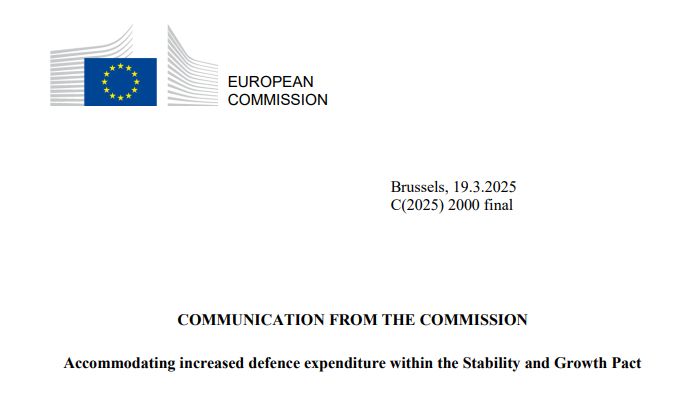Muss Deutschland jetzt viel mehr in den EU-Haushalt zahlen und ist Deutschland gar der Angeschmierte beim Vorschlag der EU-Kommission zum neuen Mehrjährigen Finanzrahmen? Die Antwort darauf ist kompliziert - aber schlecht kommt Deutschland sicher nicht weg.
Warum? Stay with me:
21.07.2025 15:41 — 👍 31 🔁 9 💬 2 📌 2

Because it fears a change of the EU fiscal rules, the Commission is resorting to a very far-reaching interpretation of the rules to make room for much more defense spending. This is a shortsighted mistake because it risks accidentally killing the rules altogether at the worst moment.
Here is why:
19.03.2025 15:04 — 👍 87 🔁 26 💬 2 📌 14

Can Germany afford to take most defence spending out of its debt brake?
Higher German defence spending would be fiscally sustainable, but would require cuts elsewhere and would breach EU fiscal rules
I published a short note on the implications of a proposed constitutional amendment in Germany, which includes an 11% of GDP fund for infrastructure and permission to fund most military spending outside the debt brake’s maximum deficit of 0.35% of GDP (Thread, 1/9): www.bruegel.org/analysis/can...
12.03.2025 08:20 — 👍 40 🔁 17 💬 3 📌 4

European Council conclusions on European defence, 6 March 2025
On 6 March, the European Council adopted conclusions on European defence.
Good outcome at the #EuCo on EU fiscal rules: National escape clause is branded as „immediate measure“ but the Commission is asked to explore further options (read: opening the rules). The insight seems to have kicked in that a prolonged use of the escape clause is probably not a good idea.
06.03.2025 19:41 — 👍 62 🔁 20 💬 0 📌 6
The paper makes many great points that go beyond this quick comparison of gross deficits. All code for replication of the above exercise is available on my GitHub github.com/lennardwelsl... 5/5
23.12.2024 16:54 — 👍 0 🔁 0 💬 0 📌 0


EU rules are forward looking, requiring more adjustment in their initial application. I estimate EU SPB targets below zero by 2035, while they remain close to 0.9% under the debt brake. Over 11 years (7+4 year adjustment), the difference could average 0.8 pp and total more than 450 bn EUR. 4/5
23.12.2024 16:54 — 👍 0 🔁 0 💬 1 📌 0


The debt brake's structural deficit cap, would imply SPBs between 0.75% and 0.9% of GDP (without gradual adjustment). For a 4-year adjustment, the avg. permitted annual structural deficit would be 0.47 pp (21 bn EUR) lower than under EU rules. For a 7-year adjustment 0.7 pp (34 bn EUR) lower. 3/5
23.12.2024 16:54 — 👍 0 🔁 0 💬 1 📌 0
Based on latest EU Commission and financial market projections, I find that Germany could face a binding debt safeguard and a 2028 target for its structural primary balance (SPB) around 0.75% of GDP. With a 3-year extension the target would be only 0.56%. 2/5
23.12.2024 16:54 — 👍 0 🔁 0 💬 1 📌 0
Do EU fiscal rules prevent a reform of the German constitutional debt brake? In a new paper @nilsredeker.bsky.social and @lucasguttenberg.bsky.social show that EU rules should leave more fiscal space. I calculated how much more and find that the difference is substantial. Short thread 1/5
23.12.2024 16:54 — 👍 3 🔁 0 💬 1 📌 0
4) The Council’s proposal weakens the role of national independent fiscal institutions (IFIs) by stating governments "may request" an assessment, as opposed to mandating it like the Commission’s proposal did.
21.12.2023 09:52 — 👍 0 🔁 0 💬 1 📌 0
3) Council-endorsed climate-investments should have been excluded from the safeguards (while remaining in the DSA). Instead, only 2025-26 RRP projects are excluded. This puts investments that are instrumental to the green transition at risk without improving debt sustainability.
21.12.2023 09:51 — 👍 0 🔁 0 💬 1 📌 0
2) The compromise on the excessive deficit procedure (EDP) doesn't go far enough: Min. adjustment steps of 0.5% of GDP exclude interest payments only until 2027. Measuring the adjustment in primary instead of in structural primary terms makes little sense (t.co/HirR2TkUcK).
21.12.2023 09:48 — 👍 1 🔁 0 💬 1 📌 0
The Bad (4 points):
1) The new "deficit resilience safeguard" requires continues fiscal adjustment until a structural deficits are below 1.5%. The minimum adjustment steps (0.25-0.4% of GDP p.a.) micromanage the adjustment process and for countries like Italy the 1.5% margin may proof too tough.
21.12.2023 09:46 — 👍 0 🔁 0 💬 1 📌 0
5) Requiring efforts beyond the current Recovery and Resilience Programme (RRP) to extend the adjustment period from 4 to 7 years will incentivize additional reforms and investments.
6) The independent European Fiscal Board has a meaningful role in monitoring the implementation of the new rules.
21.12.2023 09:45 — 👍 1 🔁 0 💬 1 📌 0
3) Requiring the DSA to be Council approved, published, and replicable will increase collective ownership.
4) The reformulation of the "debt safeguard" now prescribes debt reduction only after deficits have been brought below 3%, which is not ideal but more reasonable.
21.12.2023 09:42 — 👍 0 🔁 0 💬 1 📌 0
2) Preserving the net expenditure path as main target (ie ignoring interest payments and cyclical items) as well as general and national escape clauses will make the system less procyclical.
21.12.2023 09:41 — 👍 0 🔁 0 💬 1 📌 0
The Good (6 points):
1) Retaining country-specific fiscal adjustment based on the debt sustainability analysis (DSA) makes successful implementation more likely.
21.12.2023 09:41 — 👍 0 🔁 0 💬 1 📌 0

Our assessment of yesterday's Council compromise on on the reform of the EU fiscal rules: A reasonable outcome overall, in some respects better, in others worse than the Commission’s April proposal:
21.12.2023 09:40 — 👍 4 🔁 0 💬 1 📌 0
PhD in IR at SciencesPo Paris & Associate Fellow with the Russia Program at George Washington University. Author of the Arctic security newsletter 66° North on Substack. Writing about Russia, China, the polar regions, sometimes the seas and space.
Chief economist @ Centre for European Reform. Eurozone macroeconomic policies | Role of 🇩🇪 🇳🇱 in EU. Formerly @ECB, @IMF, @Worldbank.
Opiner for Financial Times in London. Globalisation, econ, snark. RT≠👍. Views own. alan.beattie@ft.com. Sign up to my FT Trade Secrets newsletter https://subs.ft.com/spa3_tradesecrets?segmentId=357afa03-959c-93ed-0842-58e2115025d4.
Cohost of The Odd Lots Podcast
Singer and guitarist in Light Sweet Crude
Trade policy. Partner @ Flint Global. Associate fellow @ Chatham House.
I have a Substack: https://mostfavourednation.substack.com
Alternately Defiant, Dispirited, and Despondent. Without illusions but not disillusioned. Focus on Climate, Inequality and Development.
I co-edit the Polycrisis project and newsletter https://www.phenomenalworld.org/series/the-polycrisis/
Senior Fellow at Carnegie China. For speaking engagements, please write to chinfinpettis@yahoo.com
Professor of Economics HHU Düsseldorf, Special Advisor to German Finance Minister Lars Klingbeil, Music & Chess Lover, Dad of 2
Former French Minister of State for Europe. Geopolitics, Economics, European affairs, Democracy
Professor of Economics @LMU_Muenchen. Research: #competitionpolicy, #innovation & #multinationalfirms. Chair of the 🇩🇪 Council of Economic Experts - Vorsitzende des Sachverständigenrats Wirtschaft -
www.sachverstaendigenrat-wirtschaft.de
Watching 🇪🇺 🇨🇳 🇺🇸 for Rhodium Group & GMF in Berlin. Sign up for my monthly newsletter (https://www.gmfus.org/watching-china-europe) and Substack (noahbarkin.substack.com)
Professor of Socio-Economics, University of Duisburg-Essen, Institute for Socio-Economics + Member of the German Council of Economic Experts
In the sun, I feel as one
Political Economy, the ESG anthropocene, technocracy, legitimacy and more | “Non-profit finfluencer” | @UvA_AISSR @Politics_UvA
I invest in developing economies and study how sanctions are reshaping West Asia and the world. CEO of the Bourse & Bazaar Foundation. Adjunct Prof at Johns Hopkins SAIS.
Geoeconomics and economic security at European Council on Foreign Relations | PhD
Relentless (fast) charging addict on a quest to find #MOREPLUGS
⚡️
(At better prices)
🌞💨
My newsletter is on the verge of coming back to life at electricfelix.com/linkinbio
Senior Correspondent for Europe at the South China Morning Post.
Tracking the shifting tectonic plates of global trade and geopolitics.
All posts should be heard in a Fermanagh accent.
Special Adviser to the Foreign, Commonwealth and Development Secretary of the United Kingdom.













